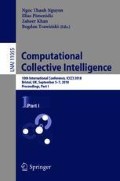Abstract
Knowledge merging is of major concern in developing probabilistic expert systems. Each system provides a consistent probabilistic knowledge while the merged knowledge base is often inconsistent. Because of this reason, a wide range of approaches has been put forward to merge probabilistic knowledge bases. However, the input of the models is the set of possible probabilistic functions representing the original probabilistic knowledge bases. In this paper, we investigate a framework for merging probabilistic knowledge bases represented by the new form. To this aim, a process to merge probabilistic knowledge bases is introduced, several transformation methods for the representation of the original probabilistic knowledge base is presented, a set of merging operators is proposed, and several desirable logical properties are investigated and discussed.
Access this chapter
Tax calculation will be finalised at checkout
Purchases are for personal use only
References
Nguyen, N.T.: Advanced Methods for Inconsistent Knowledge Management. Advanced Information and Knowledge Processing, pp. 1–351. Springer, London (2008). https://doi.org/10.1007/978-1-84628-889-0
Bloch, I., et al.: Fusion: general concepts and characteristics. Int. J. Intell. Syst. 16(10), 1107–1134 (2001)
Murray, K.S.: Learning as Knowledge Integration. Ph.D. thesis, The University of Texas at Austin (1995)
Reimer, U.: Knowledge integration for building organizational memories. In: Proceedings of the 11th Banff Knowledge Acquisition for Knowledge Based System Workshop, pp. 61–620 (1998)
Potyka, N., Thimm, M.: Probabilistic reasoning with inconsistent beliefs using inconsistency measures. In: International Joint Conference on Artificial Intelligence 2015 (IJCAI15), pp. 3156–3163. AAAI Press ©2015 (2015)
Nguyen, V.Y., Tran, T.H.: Inconsistency measures for probabilistic knowledge bases. In: Proceedings KSE 2017, pp. 148–153. IEEE Xplore (2017)
Potyka, N., Thimm, M.: Consolidation of probabilistic knowledge bases by inconsistency minimization. In: Proceedings ECAI, pp. 729–734. IOS Press (2014)
Potyka, N.: Solving Reasoning Problems for Probabilistic Conditional Logics with Consistent and Inconsistent Information. FernUniversitat, Hagen (2016)
Nguyen, V.T., Tran, T.H.: Solving inconsistencies in probabilistic knowledge bases via inconsistency measures. In: Nguyen, N.T., Hoang, D.H., Hong, T.-P., Pham, H., Trawiński, B. (eds.) ACIIDS 2018. LNCS (LNAI), vol. 10751, pp. 3–14. Springer, Cham (2018). https://doi.org/10.1007/978-3-319-75417-8_1
Nguyen, V.T., Nguyen, N.T., Tran, T.H., Nguyen, D.K.L.: Method for restoring consistency in probabilistic knowledge bases. J. Cybern. Syst. 49, 1–22 (2018). Taylor & Francis
Konieczny, S., Pérez, R.P.: Merging with integrity constraints. In: Hunter, A., Parsons, S. (eds.) ECSQARU 1999. LNCS (LNAI), vol. 1638, pp. 233–244. Springer, Heidelberg (1999). https://doi.org/10.1007/3-540-48747-6_22
Lin, J., Mendelzon A.O.: Knowledge base merging by majority. In: Dynamic Worlds: From the Frame Problem to Knowledge Management (1999)
Konieczny, S., Lang, J., Marquis, P.: DA2 merging operators. Artif. Intell. 157(1–2), 49–79 (2004)
Qi, G., Liu, W., Glass, D.H.: A split-combination method for merging inconsistent possibilistic knowledge bases. In: KR 2004, pp. 348–356. AAAI Press (2004)
Qi, G., Liu, W., Bell, D.A.: A revision-based approach to resolving conflicting information. In: UAI 2005, pp. 477–484. AUAI Press (2005)
Vomlel, J.: Methods of Probabilistic Knowledge Integration. Ph.D. thesis, Czech Technical University, Prague (1999)
Wilmers, G.: The social entropy process: axiomatising the aggregation of probabilistic beliefs. In: Probability, Uncertainty and Rationality (2010)
Adamcík, M., Wilmers, G.: The irrelevant information principle for collective probabilistic reasoning. Kybernetika 50(2), 175–188 (2014)
Adamcik, M.: Collective Reasoning under Uncertainty and Inconsistency. Ph.D. thesis, University of Manchester, UK (2014)
Konieczny, S., Pérez, R.P.: Logic based merging. J. Philos. Log. 40(2), 239–270 (2011)
Matousek, J., Gartner, B.: Understanding and Using Linear Programming. Universitext. Springer, Heidelberg (2007). https://doi.org/10.1007/978-3-540-30717-4
Boyd, S.P., Vandenberghe, L.: Convex Optimization. Cambridge, New York (2004)
Acknowledgment
The authors would like to thank Professor Quang Thuy Ha and Knowledge Technology Lab, Faculty of Information Technology, VNU University of Engineering and Technology for expertise support.
Author information
Authors and Affiliations
Corresponding author
Editor information
Editors and Affiliations
Rights and permissions
Copyright information
© 2018 Springer Nature Switzerland AG
About this paper
Cite this paper
Nguyen, V.T., Nguyen, N.T., Tran, T.H. (2018). Framework for Merging Probabilistic Knowledge Bases. In: Nguyen, N., Pimenidis, E., Khan, Z., Trawiński, B. (eds) Computational Collective Intelligence. ICCCI 2018. Lecture Notes in Computer Science(), vol 11055. Springer, Cham. https://doi.org/10.1007/978-3-319-98443-8_4
Download citation
DOI: https://doi.org/10.1007/978-3-319-98443-8_4
Published:
Publisher Name: Springer, Cham
Print ISBN: 978-3-319-98442-1
Online ISBN: 978-3-319-98443-8
eBook Packages: Computer ScienceComputer Science (R0)

